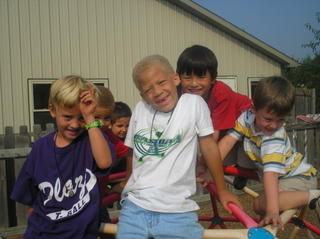 This could not have been better said. It is a remarkable piece and this woman is to be congratulated for her insight.
This could not have been better said. It is a remarkable piece and this woman is to be congratulated for her insight.Battle Creek Enquirer
September 11
Parents Are First Teachers
Ruth Kavalhuna
Parents are their children's first and most important teachers. No one can match the devotion that families give to the well-being, healthy development and educational success of their children. Multiple studies have shown that children are more likely to reach their full potential when their parents take an active role in their education. Throughout a child's growing-up years, adults play a decisive role in all aspects of their development and no period is more important than the first years.
SCIENCE AND BRAIN DEVELOPMENT
Neuroscience has discovered that an incredible amount of learning is taking place in the brains of children during the first three years of life. A newborn's brain is filled with neurons in such great abundance that it's as if it is ready and waiting to learn anything and everything. Learning takes place when these brain cells become connected to each other creating "learning pathways" upon which all future learning will take place. It is while the infant receives stimulation from the world around him that this connecting or "wiring" process takes place. A parent's job is to provide an environment that is rich in positive stimulation that will build strong learning pathways.
CRITICAL EXPERIENCES
Children who hear warm, friendly voices talking, singing, explaining and comforting during their first three years will build strong learning pathways for communication and language. This is important because most experts agree that early language development is essential to becoming a successful reader. Young children who are read to every day develop an interest in books and a love of reading that will help them become competent readers and writers in early elementary school. Babies and toddlers who are encouraged to explore the world around them by touching, climbing, seeing and doing are building the foundations for problem-solving. Children who do not have these experiences fail to develop strong learning pathways and are likely to have learning difficulties in school. The most effective way to develop a child's capacity for educational success is by assuring that she is surrounded by interesting experiences and loving people throughout her first three years.
KEY QUESTIONS FOR COMMUNITY
Every parent needs partners in the important process of raising a young child. Grandparents, child-care providers, baby-sitters, neighbors, extended family members, school systems and the community-at-large all play a role in influencing the early educational process. Our community, as well as every individual citizen, benefits when we each accept the responsibility to become involved in supporting early childhood growth and development. We need to ask ourselves some challenging questions:
· Do all parents have access to services that will educate and support their role as their child's first and most important teacher?
· Do families and health-care, child-care and education systems act as partners on behalf of the early development of our young children?
· Do all young children in our community have access to high quality early childhood books and someone to read to them every day?
· Does our community have the political will to support quality early childhood educational programs and child-care services?
When we can say "yes" to these critical questions, we will see all children entering school ready to become competent readers and communicators by the end of third grade.
Ruth Kavalhuna is director of early childhood programs for the Calhoun Intermediate School District. She may be contacted via e-mail at Kavalhur@calhoounisd.org.

2 comments:
Thanks for this article. I have found your blog by chance and been happy to find reflections i can relate with, as I'm the mother of a four year old.
Greetings from a chilean in Finland!
This is a great article. I agree with the author about the first 3 years of a child's life but there are so many children who don't have positive experiences. I am a retired social worker who has seen the effects of neglect and abuse in children. I am now a volunteer for CASA and work with a 7 year old boy who was SEVERELY neglected by his mother (he has no known father). He has resided in a mental institution for children under age 13 for almost 2 years. She visits him only when she "feels like it" which is about 2-3 times a month.
Post a Comment